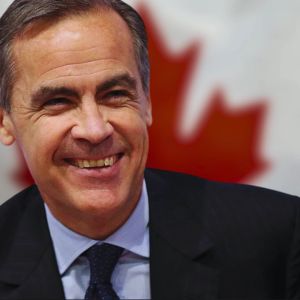Canada’s Prime Minister Mark Carney doesn’t come from politics. He comes from power. Real power. The kind that moves markets, not crowds. This is a man who ran two G7 central banks—the only living person to do that. Carney literally ran the Bank of Canada , then the Bank of England. He helped keep the UK from crashing after Brexit and predicted the 2008 financial collapse before it shredded the American economy. When it hit, he shielded Canadian banks from the worst of it. That’s the guy now facing Trump. Carney has been on Goldman Sachs’ leadership team, chaired Bloomberg, and led Brookfield. He was also chair of the Group of 30, a DC-based invite-only club of the top thirty minds in global finance. Almost all of the people Trump hired for economic policy right now have worked under Carney at some point, that’s how legendary he is. Mr. Mark Carney. Creator: Adrian Wyld | Credit: AP Carney cuts rates while others raise them Carney’s big break came in 2008. One month into his new job as Bank of Canada governor, he dropped the overnight rate by 50 basis points. Europe went the other way and raised rates. Then everything collapsed. Carney had already moved Canada’s banks away from American subprime debt. When the crash hit, Canada took the smallest hit and bounced back the fastest. GDP and jobs were back to pre-crisis levels before any other G7 country. In April 2009, he froze the policy rate with a tool called “conditional commitment,” signaling it wouldn’t move for at least a year. That built back credit and trust. The economy started climbing out by mid-2009. Even Newsweek had to admit it: “Canada is thriving.” Canadian banks were liquid while the U.S. banking system was on fire. Carney got a bunch of titles thrown at him after that—Time 100, Reader’s Digest Most Trusted Canadian, Euromoney’s Central Banker of the Year, and Financial Times called him one of the “Fifty who will frame the way forward.” But this wasn’t some fame ride. In late 2012, the UK pulled Carney in. George Osborne, Britain’s Chancellor, named him the next governor of the Bank of England. Carney took over in July 2013. For the first time in its 300-year history, that job went to a non-Brit. The bank got new power under him, including the ability to set bank capital requirements. Carney walked away from politics—until now In 2012, Stephen Harper, Canada’s Prime Minister, asked Carney to join the Conservative government as finance minister. Carney said no. “It wasn’t appropriate,” he told the CBC in 2025. “Going straight from governor to politics didn’t sit right.” A year later, the Liberal Party asked him to run in their 2013 leadership race. He passed on that too. But after stepping down in the UK, he pivoted to climate finance. The UN made him special envoy. Boris Johnson hired him as finance advisor for COP26. That conference got pushed to 2021, but Carney stayed in the role. He gave speeches for the Liberal Party, backed Ottawa mayoral candidate Catherine McKenney, and in 2023 endorsed UK Labour’s Rachel Reeves for Chancellor. In 2024, Carney joined Trudeau’s Task Force on Economic Growth. After Chrystia Freeland stepped down, his name came up again—this time as a potential finance minister. Then Trudeau resigned. Carney ran. He won the Liberal Party leadership in March 2025 by a landslide. Five days later, he was sworn in as Canada’s 24th prime minister. He’s the first PM born in Canada’s territories, the third born west of Ontario, the second PM with a PhD, and the first to take office without ever being elected to Parliament. The last person to do that was John Turner in the 1980s. President Donald J. Trump. Source: EPA On March 13, Trump hit Canada with a 25% tariff on cars and car parts. Called it “permanent.” The next day, Carney stood in front of reporters in Ottawa and said , “We’ll match it.” He called out the old U.S.-Canada setup, saying the era of “deep economic and military ties” was over. Carney’s response? New tariffs on U.S. vehicles coming into Canada. No hesitation. “We will respond with retaliatory tariffs that have maximum impact on the U.S.,” he said. He told Canadians to “fundamentally reimagine our economy.” The gloves are off. Trump has been mocking Canada since his campaign. He trashed Trudeau, mocked Canadians, and said—repeatedly—that Canada should just become the 51st state. “It makes sense,” Trump has said. Carney clearly isn’t laughing. Carney also has one foot in global markets and the other in Canadian politics. He was a triple citizen—Canadian, British, and Irish—but before becoming PM, he started the process of renouncing his British and Irish passports. “Full commitment to Canada,” his team said. He’s Catholic. The Tablet once named him the most influential Catholic in Britain. He speaks French, but admits it’s “far from perfect.” Carney is someone Trump can’t bully. And behind that dry tone and clean suits is someone who’s already shaped the world Trump claims to run, as a side quest.















